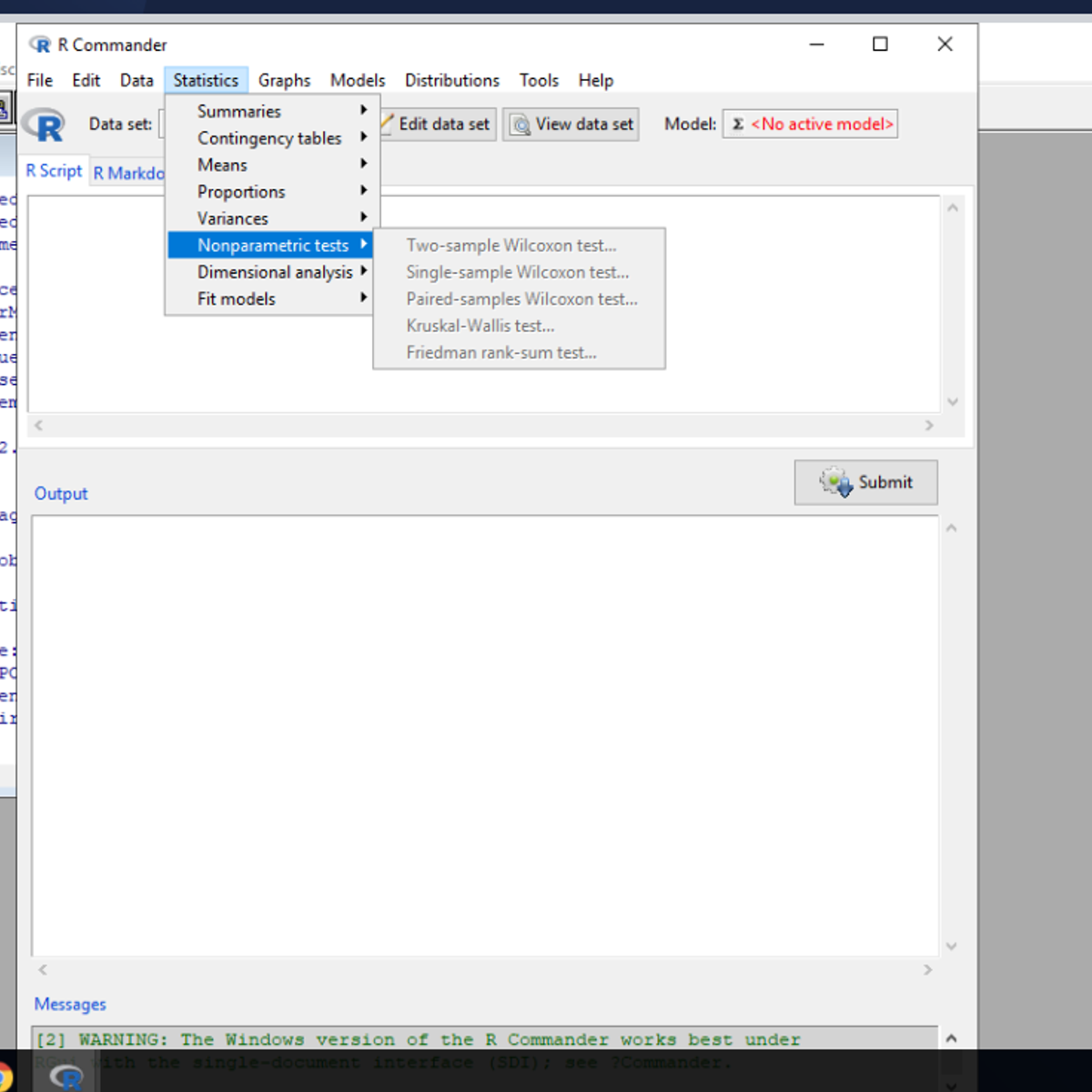
In this project , you will learn how to conduct non parametric tests using Rcmdr. Non parametric tests are powerful tests which are conducted when underlying assumptions are not met in the data . After completing the project, you will be able to apply the appropriate test for the right data set. You will also learn how to do it in an easy to use Rcmdr.
Three deals to help you save


What's inside
Syllabus
Good to know
Save this course
Reviews summary
Well-received resource for statistical testing
Activities
Organize Non Parametric Test Resources
Show steps
Organize non parametric test resources to improve accessibility and aid in review
Show steps
-
Gather resources
-
Create a system for organizing resources
-
Review resources regularly
Review Prerequisites for Non Parametric Tests
Show steps
Refresh knowledge of probability and statistics to build a stronger foundation for non parametric tests
Browse courses on
Probability
Show steps
-
Review probability concepts
-
Review statistical concepts
-
Solve practice problems
Review Non Parametric Statistical Methods
Show steps
Review the fundamentals of non parametric statistical methods to build a strong foundation
View
Nonparametric Statistical Methods
on Amazon
Show steps
-
Read the book
-
Take notes
-
Solve practice problems
Five other activities
Expand to see all activities and additional details
Show all eight activities
Attend a Webinar on Non Parametric Tests
Show steps
Attend a webinar on non parametric tests to learn from experts and connect with others in the field
Show steps
-
Find a webinar on non parametric tests
-
Register for the webinar
-
Attend the webinar
-
Ask questions and participate in discussions
Practice Non Parametric Tests using Rcmdr
Show steps
Practice conducting non parametric tests using Rcmdr to reinforce understanding of concepts
Show steps
-
Go to Rcmdr software
-
Load the data set
-
Select the appropriate non parametric test
-
Run the test
-
Interpret the results
Solve Non Parametric Test Problems
Show steps
Solve non parametric test problems to practice application of concepts
Show steps
-
Find non parametric test problems
-
Solve the problems
-
Check your answers
Conduct a Non Parametric Test Project
Show steps
Conduct a non parametric test project to apply learning and demonstrate skills
Show steps
-
Define the research question
-
Collect data
-
Choose the appropriate non parametric test
-
Conduct the test
-
Write a report
Create a Tutorial on Non Parametric Tests in Rcmdr
Show steps
Create a tutorial on non parametric tests in Rcmdr to solidify learning and share knowledge
Show steps
-
Plan the tutorial
-
Gather materials
-
Write the tutorial
-
Record the tutorial
-
Publish the tutorial
Organize Non Parametric Test Resources
Show steps
Organize non parametric test resources to improve accessibility and aid in review
Show steps
- Gather resources
- Create a system for organizing resources
- Review resources regularly
Review Prerequisites for Non Parametric Tests
Show steps
Refresh knowledge of probability and statistics to build a stronger foundation for non parametric tests
Browse courses on
Probability
Show steps
- Review probability concepts
- Review statistical concepts
- Solve practice problems
Review Non Parametric Statistical Methods
Show steps
Review the fundamentals of non parametric statistical methods to build a strong foundation
View
Nonparametric Statistical Methods
on Amazon
Show steps
- Read the book
- Take notes
- Solve practice problems
Attend a Webinar on Non Parametric Tests
Show steps
Attend a webinar on non parametric tests to learn from experts and connect with others in the field
Show steps
- Find a webinar on non parametric tests
- Register for the webinar
- Attend the webinar
- Ask questions and participate in discussions
Practice Non Parametric Tests using Rcmdr
Show steps
Practice conducting non parametric tests using Rcmdr to reinforce understanding of concepts
Show steps
- Go to Rcmdr software
- Load the data set
- Select the appropriate non parametric test
- Run the test
- Interpret the results
Solve Non Parametric Test Problems
Show steps
Solve non parametric test problems to practice application of concepts
Show steps
- Find non parametric test problems
- Solve the problems
- Check your answers
Conduct a Non Parametric Test Project
Show steps
Conduct a non parametric test project to apply learning and demonstrate skills
Show steps
- Define the research question
- Collect data
- Choose the appropriate non parametric test
- Conduct the test
- Write a report
Create a Tutorial on Non Parametric Tests in Rcmdr
Show steps
Create a tutorial on non parametric tests in Rcmdr to solidify learning and share knowledge
Show steps
- Plan the tutorial
- Gather materials
- Write the tutorial
- Record the tutorial
- Publish the tutorial
Career center
Data Analyst
Statistician
Data Scientist
Research Analyst
Biostatistician
Market Researcher
Data Engineer
Software Developer
Quantitative Analyst
Actuary
Epidemiologist
Survey Researcher
Risk Manager
Business Analyst
Data Visualization Specialist
Reading list
Share
Similar courses
OpenCourser helps millions of learners each year. People visit us to learn workspace skills, ace their exams, and nurture their curiosity.
Our extensive catalog contains over 50,000 courses and twice as many books. Browse by search, by topic, or even by career interests. We'll match you to the right resources quickly.
Find this site helpful? Tell a friend about us.
We're supported by our community of learners. When you purchase or subscribe to courses and programs or purchase books, we may earn a commission from our partners.
Your purchases help us maintain our catalog and keep our servers humming without ads.
Thank you for supporting OpenCourser.


